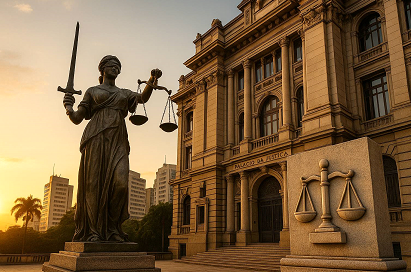Rio de Janeiro
Av. Presidente Wilson, 231 / Salão 902 Parte - Centro
CEP 20030-021 - Rio de Janeiro - RJ
+55 21 3942-1026

Brazil operates a civil law system with specialized labor, tax, electoral, and military courts. Civil, commercial, and constitutional disputes begin in state or federal trial courts. They may progress through appellate courts to the Superior Court of Justice or the Supreme Federal Court on questions of federal law or constitutional issues.
A litigation attorney leads case assessments, drafts pleadings, marshals evidence, cross-examines witnesses, and crafts appellate strategy. Counsel balances procedural tactics with negotiation leverage to attain favorable judgments or settlements.
Cases follow a structured path of petition, defense, evidence production, hearings, and judgment. Brazilian procedure emphasizes written submissions, but oral arguments and witness examination are central at evidentiary hearings.
Courts may grant urgent relief such as asset freezes or performance orders when delay risks irreparable harm. Litigation counsel demonstrates plausibility and urgency while posting security when required.
Civil procedure allows targeted disclosure of specific documents rather than broad discovery. Attorneys employ court-ordered production, expert reports, and site inspections to build factual records.
Court-appointed experts draft technical opinions subject to party observation and independent counter reports. Litigators collaborate with subject matter specialists to challenge methodologies and conclusions.
Appeals must cite legal error or manifest injustice. Brazil's binding precedent system, Súmulas and Repetitive Appeals, harmonizes jurisprudence, enhancing predictability.
The law encourages mediation and arbitration. Litigation attorneys often advise on settlement strategies concurrent with court proceedings or enforce arbitral awards through homologation.
Public prosecutors and consumer associations may file collective actions for environmental damage, consumer rights, or labor violations. The defense strategy involves jurisdictional challenges, evidentiary narrowing, and risk-quantified settlement offers.
Winning a judgment triggers the enforcement stage, during which assets are located through electronic systems such as BacenJud. Attorneys negotiate payment plans or initiate auction proceedings to secure recovery.
Shareholder disputes, contract breaches, and M&A fallout require strategic document reviews and interim measures preserving corporate control.
The labor courts feature streamlined oral proceedings and swift judgments. Litigants must comply with pre-hearing conciliation sessions and labor precedent Súmulas.
Tax litigation often begins with administrative challenges before CARF panels. Attorneys argue valuation methods, tax classification, and penalty mitigation before resorting to judicial review.
Infrastructure projects face injunctions based on licensing irregularities. Litigators present technical environmental studies and socioeconomic data to balance development and conservation.
Foreign judgments require homologation by the Superior Court of Justice. Attorneys navigate translation bond requirements and defend recognition objections.
Third-party funders evaluate claim value, jurisdictional risks, and enforcement prospects. Counsel structures funding agreements that are compliant with confidentiality and ethical rules.
Data preservation orders WhatsApp message authentication and blockchain timestamping emerge as pivotal evidentiary tools.
Corporate investigations may trigger simultaneous criminal, civil, and administrative actions. Litigation attorneys coordinate defense narratives, safeguard privilege, and manage media exposure.
Structured mediation sessions often enable creative remedies combining monetary compensation, corrective action, and confidentiality.
Experienced litigators synthesize procedural mastery, sector knowledge, and negotiation acumen to deliver strategic advantage.
For tailored legal guidance, please email: [email protected]
 Mr. Alessandro Jacob speaking about Brazilian Law on "International Bar Association" conference
Mr. Alessandro Jacob speaking about Brazilian Law on "International Bar Association" conference Av. Presidente Wilson, 231 / Salão 902 Parte - Centro
CEP 20030-021 - Rio de Janeiro - RJ
+55 21 3942-1026
Travessa Dona Paula, 13 - Higienópolis
CEP -01239-050 - São Paulo - SP
+ 55 11 3280-2197